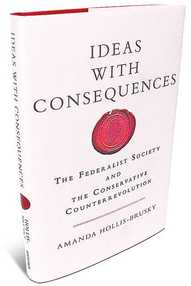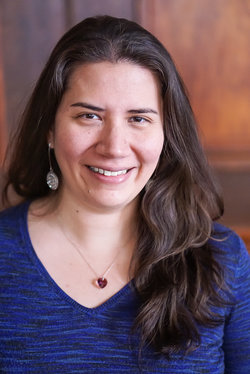 Welcome to week two of the new series #WritersQuick5 - where we learn about writing from fellow writers. This week we're going to hear from Amanda Hollis-Brusky, Associate Professor of Politics at Pomona College. Amanda and I first met back in 1999 as fellow cohorts in the Core Curriculum program at Boston University. I knew from the day I met her that she was significantly smarter than me, but that has become more apparent as the years have gone on, particularly once I picked up her book Ideas With Consequences: The Federalist Society and the Conservative Counterrevolution. 'Ideas' was recently awarded the 2016 C. Herman Pritchett Award by the American Political Science Association's Law and Courts division for the best book on law and courts published the year before. Amanda shares answers with us on what it's like to write in an academic environment. Let's see what she has to say... Question #1: Where do you write and why do you write there? I write on campus - mostly in my office but in the library or other spaces on campus from time to time. A group of faculty get together for "write-ins" about once a month in the history department library. I write on campus because I like to keep "work hours" separate from "home/family" time and physically going to work puts me in that mindset. Engaging in academic writing from home is quite challenging for me - too many distractions (laundry, house projects, neighbors walking by, etc). That being said, I have written opinion pieces and talks/public lectures at home with relative ease. I consider these "bonus" pieces that I write on my own time so the work-home dichotomy is not fully compromised. Question #2: What is unique about writing for your particular genre? Academic writing speaks to an audience of similarly trained and educated academics. There is a jargon, a shared literature and norms that one is expected to follow. It is argumentative, evidence-based, and cannot make claims that are not specifically supported by the evidence. It is also, for the most part, inaccessible to those outside one's field of study. The one exception to that, I think, is the academic book which meets the tough standards and expectations of an "academic" or scholarly work but is also more broadly accessible to the public. When I put my public intellectual hat on, however, the expectations are quite different - I am working to distill complex, scholarly ideas and concepts for public consumption. In my mind, this is more similar to teaching; to what I do for my students in the classroom. I like this kind of writing and, were it not for the "publish or perish" expectations of academia, I would do more of this kind of writing. Question #3: What are some of your grammar or punctuation pet peeves? First off, I love the Oxford comma - let's just get that out of the way. Misplaced apostrophes (the non-possessive plural mistake) and semi-colon abuse (my freshman who discover the semi-colon often become enamored with it and use it WAY too much) are my biggest grammatical pet peeves. Question #4: At what point in your writing process do you start to bring other people in to review your work? I have been co-authoring for a while. The nice thing about co-authorship is that there is a built-in peer review check. I send drafts of sections to my co-author, he reads and comments and sends them back and vice-versa. When I solo-author I usually send a draft to a trusted colleague or two before I send a piece out for peer-review. Question #5: What advice would you give to a new writer about the writing process? Make writing a daily habit, even if it is just for 20 minutes. Carve out a time when there are no other distractions. For me, this has been key. When I'm at my best (which, admittedly, has not been lately) I am writing for an hour every morning. Longer stretches can and may be possible on some days, of course. But making writing a habit is key to long-term productivity. Thank you to Amanda for these wonderful answers and for your insights on writing. Follow Amanda on Twitter and stay-tuned for her insights during this upcoming administration. And, once again, here's the link to where you can buy her incredible book: Ideas with Consequences. Stay tuned for the next #WritersQuick5. We're going to take a break next week for the holidays, but we'll be back the first week of January. If you'd like to be considered for our #WritersQuick5 series, please contact me and use #WritersQuick5 in the first line of your email. Thanks, and Happy Holidays!
0 Comments
Leave a Reply. |
AboutWriter. Archives
June 2020
Categories |
